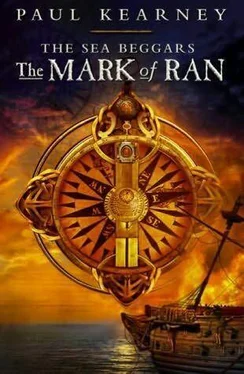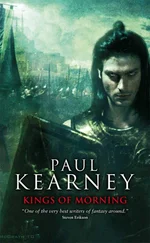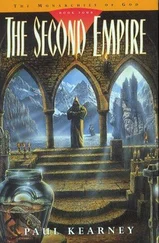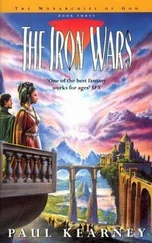Paul Kearney - The Mark of Ran
Здесь есть возможность читать онлайн «Paul Kearney - The Mark of Ran» весь текст электронной книги совершенно бесплатно (целиком полную версию без сокращений). В некоторых случаях можно слушать аудио, скачать через торрент в формате fb2 и присутствует краткое содержание. Жанр: Фэнтези, на английском языке. Описание произведения, (предисловие) а так же отзывы посетителей доступны на портале библиотеки ЛибКат.
- Название:The Mark of Ran
- Автор:
- Жанр:
- Год:неизвестен
- ISBN:нет данных
- Рейтинг книги:3 / 5. Голосов: 1
-
Избранное:Добавить в избранное
- Отзывы:
-
Ваша оценка:
- 60
- 1
- 2
- 3
- 4
- 5
The Mark of Ran: краткое содержание, описание и аннотация
Предлагаем к чтению аннотацию, описание, краткое содержание или предисловие (зависит от того, что написал сам автор книги «The Mark of Ran»). Если вы не нашли необходимую информацию о книге — напишите в комментариях, мы постараемся отыскать её.
The Mark of Ran — читать онлайн бесплатно полную книгу (весь текст) целиком
Ниже представлен текст книги, разбитый по страницам. Система сохранения места последней прочитанной страницы, позволяет с удобством читать онлайн бесплатно книгу «The Mark of Ran», без необходимости каждый раз заново искать на чём Вы остановились. Поставьте закладку, и сможете в любой момент перейти на страницу, на которой закончили чтение.
Интервал:
Закладка:
Finally the Master and his companion halted before a series of tall warehouses right on the wharves. There were fewer people abroad here, some drunken longshoremen and forlorn whores. Psellos drew his sword, and kicked open the side door of one of the buildings. There was a dim light within. He and Quare entered, shutting the door behind them.
Rol’s curiosity peaked again. He dared not try the same door, but went round the back of the warehouse and clambered up a mound of junk: discarded barrels and crates, rolls of sodden canvas, frayed ship’s rigging rotting in mounds. He was able to haul himself upon a sill and peer in a grimy window. He had to spit on the glass and wipe the filth off it to see through it. But it was dark inside. He swore softly to himself, hesitating, and at last tried the window. After a couple of sharp thumps it opened inward in a spray of rotten splinters and insect husks. Gulping at the noise, Rol crawled through and let himself down inside.
He was afraid now, and yet there was a bloody-mindedness at work in him too. All this had something to do with Rowen’s lateness, he was sure.
He had an impression of thick beams rising above him. Stone under his feet, and dust hanging in the air. He stifled a sneeze. The warehouse seemed disused, partly derelict-he could see the stars through chinks in the roof-and there was all manner of rubbish strewn about it and heaped against the walls. Rol fumbled through the debris, disturbing a nest of mice, exploding a tight knot of cockroaches, until finally his fingers fastened on a length of wood that seemed free of worm. A belaying pin. It had all the satisfying heft of a club, and he slapped it into one palm with a little more confidence.
He was sure he could hear raised voices now, and he picked his way to a brightness by one wall: a passageway that led to some light source, and the reek of smoke. He crept along it as silently as if he were hunting quail up on the headland on Dennifrey.
And stopped. Somehow his eyes had caught the steel glitter and his legs had halted of their own accord before the import even registered with his brain. Now he crouched and studied intently the second’s glimpse that had brought him up short. Two wires strung across the passageway at shin and neck height. He followed them to the walls and found they were wound about iron hooks set into the crumbling masonry. Before they reached the hooks, their steely length was hung with a row of small silvery bells.
Rol breathed out slowly. After a moment he mustered up the courage to move between the wires, and continue on his way-more slowly now, his eyes scanning the very air in front of him.
The passageway opened out onto a gallery that ran all the way round the walls of a long chamber, some ten feet from the ground. The wood of the gallery was crooked and worm-eaten, and Rol dropped to his belly and crawled out upon it gingerly. Finally he was able to look down on the space below.
A fire burned there on the stone floor of the chamber, the only illumination in the room, and the smoke of it smarted Rol’s eyes. About it a tatterdemalion band of strange figures were warming their hands and passing an earthenware jug between them. They were clad in rags and oddments of leather byrnies, oilskin cloaks, even the tattered remnants of women’s skirts. Some wore caps, others had grubby scarves tied about their heads, but all had feathers jutting from their headgear. Their faces were black with filth, eyes white in the midst of it, mouths like red laughing holes. They were jabbering to one another in a language Rol did not understand, but as he listened, he thought that now and again he caught a gist of the meaning behind it-as though it was not an entirely foreign language but a debasement or dialect of one he knew. Gascarese was the common tongue of the Seven Isles, and this was an offshoot, or a corruption of it.
The men’s talk died away as Psellos and Quare entered the chamber by a ground-level door. Rol shrank back into the shadows, and the rotten wood of the gallery creaked under him.
Psellos held up one empty hand in greeting, though his rapier was naked in the other. The lantern was shaking in Quare’s fist, and the bodyservant’s face was white as old ivory, ashine with sweat. Psellos appeared wholly at ease, except for the concentrated glitter of his eyes.
The raggedly caparisoned figures about the fire spread out at once, and from hidden places in their clothing they drew out knives and hammers. Psellos grinned.
“Canker! Is this the way to greet an old friend?”
One of the ragged men stepped forward. He had a mouth full of yellow teeth and his feathered cap was set at a jaunty angle on the back of his head. He held a long, slim knife.
“Well, well,” he said in accented Gascarese, “the lordship himself. To what do we owe this honor?”
“You have something of mine here, Canker. An entire night was not in the deal.”
Canker smiled, and spread his hands in a gesture of helplessness. “What can I say, my lord? We are bewitched, enthralled. And not all of us have had a turn yet.”
Psellos looked about the chamber, as if counting heads. A flicker of distaste passed his countenance and was gone. He sheathed his sword. “Tell me you have some decent drink in this louse-hole.”
Canker laughed, and the men in the chamber seemed to relax, their weapons sinking by their sides.
“The King of Thieves may be many things, but he is no barbarian. There is Bionese here, for those of discernment. If one so grand will deign to drink with the dregs of this world.”
“I’ve drunk with worse,” Psellos said, and stepped forward.
From somewhere a silver goblet inlaid with gold and set with lapis lazuli was produced. Canker waved a filthy hand and one of his subordinates filled it from a bulging wineskin. Psellos studied the proffered goblet with a connoisseur’s eye, and drank deeply.
“Exquisite,” he said. “The vintage of the year before last, and the skin has treated it surprisingly well. I congratulate you, Canker. I had no idea your cellar was so good.”
“Not my cellar, my lord Psellos, but that of Lord Perrivale. Congratulate him if you must.”
Psellos raised an eyebrow. “Well, I am doubly impressed. Perrivale is not the easiest mark on the street. They say his manse is a veritable fortress.”
“Even a fortress must have a door.”
“Indeed. In the midst of stealing fine wines and heirlooms I trust you have found time to attend to my errand. I do not usually make down payments in advance.”
Canker bowed. From the breast of his ragged apparel he produced a scroll wound about a wooden spindle and sealed with black wax. He handed it to Psellos with something of a flourish.
Psellos’s face did not change, but something came into his eyes, a blaze of hungry triumph. He held the scroll as though it were made of thousand-year-old glass. “Ah, Canker,” he murmured, “you are an artist.”
“The down payment is being enjoyed as we speak,” Canker said. “When will the balance of the fee be delivered?”
Psellos’s eyes did not leave the scroll. “Quare,” he snapped.
The manservant came forward, reaching into a belt-pouch. He produced a slip of paper. “Remius and Midd, on Pandreddin Street. You may have it in credit or in gold. They are expecting you.”
Canker did not deign to read the paper. He stuffed it negligently into his tattered robe. “As always, a pleasure to do business with a professional,” he said.
Psellos was wrapping the scroll in a lace handkerchief. “When will the down payment be available for other work?”
Canker shrugged. “My subjects are hale and hearty men beneath their rags. You are satisfied with their work, why not let us have her for another day? Call it a bonus.”
Читать дальшеИнтервал:
Закладка:
Похожие книги на «The Mark of Ran»
Представляем Вашему вниманию похожие книги на «The Mark of Ran» списком для выбора. Мы отобрали схожую по названию и смыслу литературу в надежде предоставить читателям больше вариантов отыскать новые, интересные, ещё непрочитанные произведения.
Обсуждение, отзывы о книге «The Mark of Ran» и просто собственные мнения читателей. Оставьте ваши комментарии, напишите, что Вы думаете о произведении, его смысле или главных героях. Укажите что конкретно понравилось, а что нет, и почему Вы так считаете.












